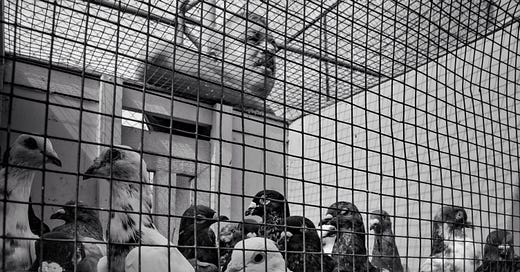Raising adults prepared for a free society
Can this be done when kids are educated in captivity?
The Mosquito Coast is an Apple Original series based on a book and movie about an inventor, Allie, and his family who are hiding from the U.S. government. The two kids of Allie are homeschooled and have little access to the outside world—no phones, no TV, and no friends. In one scene, while the family is on the run in Mexico, the two children are looking at caged birds, and the son wonders if they should buy one of the birds to set it free. The daughter, who is older, responds to his proposition by saying: "They've been raised in captivity. They wouldn't know how to be free." Presumably, the creator of the show is commenting on the life of the two homeschooled kids, given that in a previous scene the brother was getting stoned and drunk with young adults he had just met, and not handling it well.
A common perception of homeschooled kids is that they are being kept in the house all day and have been cut off from the world. The prevailing image is one of parents limiting their child's exposure to individuals that hold, and information that shares, views different from their parent's worldview, typically based on religion. The picture painted is one in which children are essentially being held in captivity. This is rarely the case, but a dominant perception none the less.
Is school much different? Certainly, in school kids are surrounded by a diverse array of other kids and adults, but aren't they also being held in captivity? No child, not even a teenager, can leave school without permission or consequence. And parents are required by law to send their kids to school or follow state protocol if they choose to educate them at home.
Formal education ostensibly prepares young people to live in a free society, or at least it professes to and ought to. But if education is provided to the young over the span of 12 or more years while in captivity, are the students really learning how to be free? More over, does a prescribed curriculum delivered equally to all kids by adults teach them how to be free?
Generally, to live well in a free society one must obtain and maintain a job that pays a livable wage (pays for the essentials required to survive, such as food and shelter); cultivate and sustain interpersonal relationships; know how to honor the rights and freedoms of others; make choices for the betterment of themselves, their family, and their community; and solve one's own problems or know how to access and deploy external resources to solve problems. No doubt, these aspects of how to live well are debatable. I have omitted some that I think are important, and an entire article or book could be written about what it means to live well, but this list includes what I think most people would agree are ingredients for living well in modern times.
Thus, learning how to be free would seemingly require that more responsibility be placed on children and less on teachers and other adults. Kids would need more opportunities to make choices, more opportunities to do things without adult supervision, more opportunities to solve problems, more opportunities to resolve interpersonal issues, and more opportunities to discover, develop, and hone skills. To be sure, a body of knowledge needs to be imparted to students by adults with relevant knowledge, but some level of independence and self-direction on the part of students is necessary to learn how to exercise freedom.
I am not convinced that one can effectively learn how to be free within the walls of a school, at least not in one that has a prescribed curriculum that all students must adhere to regardless of ability or interest. Some argue that learning how to respond to authority is an element of learning how to live in a free society, which schools, along with parents, help develop. The presence of competent adults in the lives of children is necessary, given that they are not yet prepared to fully navigate life on their own, but reliance on adults should lessen as children age not maintain or increase. Perhaps this is a non-conforming view, but one is not really prepared for freedom if they give undo deference to authority.
Ultimately, I wonder: Can a compulsory education via schools prepare the young for freedom?




